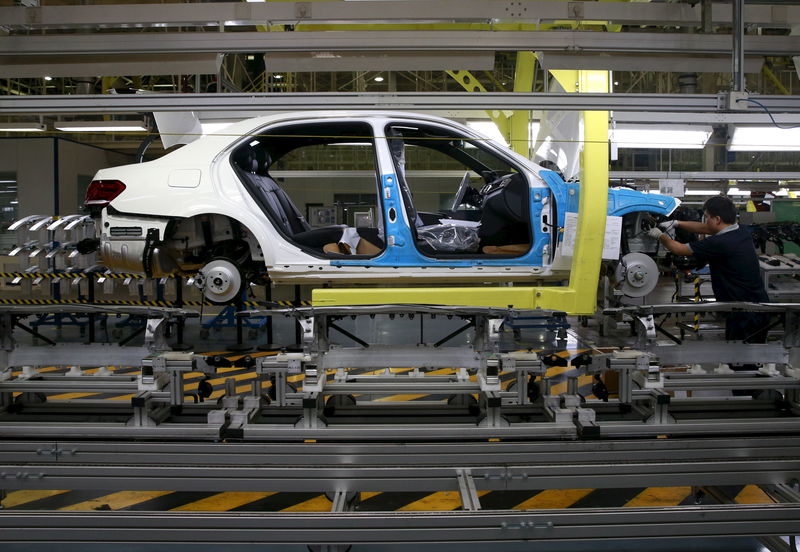By Tatiana Jancarikova and Michael Kahn
BRATISLAVA/PRAGUE (Reuters) - When David landed an assembly line job at Volkswagen's (DE:VOWG_p) Bratislava factory, his colleagues congratulated him on securing a well-paid position he could ride to retirement.
Two years later, he is among the 3,000 workers being laid off at the plant that produces the Volkswagen Touareg and Porsche Cayenne in a round of job cuts that has sent shockwaves through Slovakia, the world's biggest car producer per capita.
"All my colleagues were saying there's nothing to worry about, if I get used to the work load and work pace, the salary will gradually increase and I will have a stable job until retirement," said David, who declined to give his last name.
"And suddenly I get a call from human resources and learn that I'm being let go."
The job losses at the factory, Slovakia's largest private sector employer, underline the challenges the country faces to keep the engine revving in an industry that accounts for about 12% of annual economic output and more than one in ten jobs.
Competition from lower-cost southeastern European markets, a shift to electric vehicles and global trade tensions are among the headwinds buffetting the small central European nation as automakers mull where to launch future production lines.
Volkswagen itself is looking at building a new plant in eastern Europe, with trade publications citing Bulgaria, Serbia and Turkey as the most likely locations.
While David found a job at another carmaker, the layoffs at the Bratislava plant, which also makes the Audi Q7 and Q8 models, have put the government on alert.
"To use a car metaphor, we see a warning light, we don't need to take the car for a general repair yet," economy minister Peter Ziga told Reuters.
"We have 300,000 people working in the car sector (directly and indirectly). Should anything happen to them it would be serious."
The uncertainty has spurred unions, which have previously pushed for big wage increases, to change tack.
"At the moment, we do not focus on salaries, the priority is job stability," Volkswagen union chief Zoroslav Smolinsky told Reuters. "We need to wait out the worse times and wait for the better times."
COMPETITIVE EDGE
Seeking to bolster an auto industry that accounts for 44% of industrial output and 40% of exports, the government has approved subsidies to boost the sale of electric cars and announced tax breaks of up to 200% of the amount invested in research and development.
But at the same time, moves to raise the minimum wage and increase bonuses for night shifts introduced last year are making Slovakia less competitive, said Jan Pribula, secretary general of the Slovak Automotive Industry Association.
"This is the time when companies are deciding who gets new models in seven years," said Pribula, whose group represents Slovakia's four carmakers - Volkswagen, PSA Group (PA:PEUP), Kia Motors (KS:000270) and Jaguar Land Rover [TAMOJL.UL] - along with suppliers, research institutes and importers.
"It is important to send a signal that we are responsible because now we are gradually losing a competitive edge."
Slovakia is not the only central European country facing such challenges. Fellow European Union members the Czech Republic, home to Volkswagen's Skoda brand, and Hungary, where both BMW (DE:BMWG) and Daimler (DE:DAIGn) have plants, rely heavily on investment from foreign automakers.
A brewing global trade war is a particular concern for such countries, given their high reliance on foreign trade, European Central Bank President Mario Draghi said earlier this month.
Deloitte Chief Economist David Marek has said a 25% tariff on U.S. imports of cars from Europe would cut the revenue of the Czech auto industry by 12 billion crowns ($532 million) a year.
Poland, the region's biggest economy, is betting on electric vehicles, setting a target of having 1 million such cars and vans on the road by 2025 and highlighting a battle for investment as the auto industry embraces new technologies.
At the same time, faltering global growth has led some carmakers to put expansion plans on hold, such as Daimler's announcement in May to postpone an increase in capacity at its Kecskemet compact-car plant in Hungary.
"It has been taken for granted that plants like Bratislava would just carry on and produce the next generation model," Carol Thomas, an auto analyst at LMC Automotive, told Reuters.
"But we can't just assume that anymore. Plants will not only have to fight for new models, they will also face greater competition to retain new generations of models they already produce."
So far this year, Volkswagen has scaled back production lines in Bratislava and returned workers borrowed from Hungary’s Audi plant in 2016.
"This is the key year that will decide the future of the Slovak factory," VW Slovak Chief Executive Oliver Grunberg said, adding a decision was expected by the end of the year.
"Improvements in Slovakia’s business environment would help increase attractiveness of Bratislava's plant."
